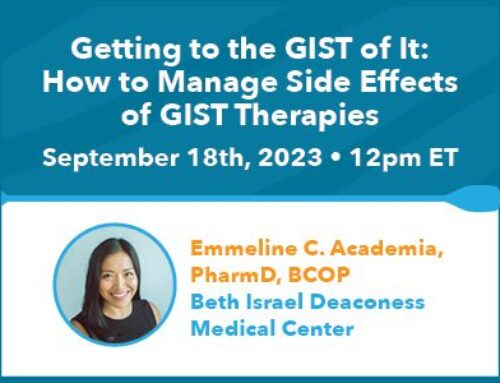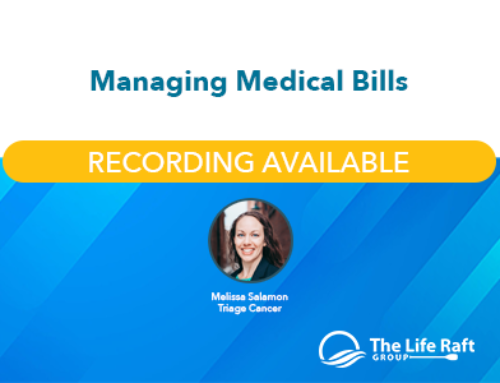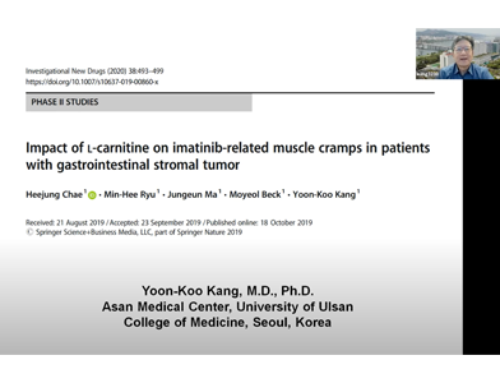Updated 2/9/2022
Muscle cramps can occur during cancer treatment, and it is a common side effect patients in our Patient Registry experience. GIST Treatments including Gleevec, Sutent, Stivarga, Qinlock and Ayvakit can cause a reduction in levels of calcium and magnesium in the blood. It is believed that the reduction in these levels can be one of the causes of muscle cramps.
The Life Raft Group encourages patients to talk to their doctor about monitoring calcium and magnesium levels and to ask whether they should incorporate calcium and magnesium supplements into their treatment plan. In addition, a number of patients have reported low levels of Vitamin D while on medication. Vitamin D helps absorb calcium and it is a good idea to have Vitamin D levels checked as well.
Checking these levels can be done by a blood test. In some patients, low levels of phosphorus (hypophosphatemia) or high levels (hyperphosphaturea) have been reported. Monitoring phosphate levels may also be useful. If you are unsure of your vitamin levels, a good starting point is to discuss doing a complete blood workup to determine a baseline and to check for any deficiencies. The LRG encourages its members to always discuss these issues with their doctor before changing anything in their routine as taking too many of any supplement/vitamin can also cause adverse effects.
Here are some tips for easing muscle cramps:
- Increase your fluid intake. Dehydration can cause muscle pain, so make sure to drink a lot of fluids. We have had several patients report improvement in cramps after increased water consumption. This may be especially important if you are having other problems like diarrhea (which causes dehydration).
- Drink electrolyte replacement beverages (including Gatorade, Powerade and other electrolyte replenishing drinks)
*Please note to discuss these beverages with your doctor as some can have high levels of sugar. - Drink tonic water
- Undergo a physical therapy program.
- Undergo an occupational therapy program.
- Make sure you are getting the appropriate amount of sleep.
- Try hot/cold therapy to relax the muscle(s).
- Make sure you are getting enough movement throughout the day to use your muscles
- Try stretching
- Reduce sodium/caffeine/alcohol intake as that can lead to dehydration
- Patients in the Life Raft Group Patient Registry share that Ivory SoapTM helps with cramping. Remove the wrapper and place the bar of soap between the bedsheets. Some patients say that this has significantly helped with their cramps, especially leg cramps. Some have also mentioned that when the cramps are severe, they will place a travel-sized bar in their socks to sleep.
Some patients on Gleevec can have an increased CPK (creatine phosphokinase) level in the blood. CPK is a marker of muscle damage and can be high in up to 57% of GIST patients taking Gleevec. It has been suggested considering testing CPK as part of the standard clinical chemistry workup of Gleevec patients as an objective measure of musculoskeletal complaints.1
Besides these lifestyle change or adaptation suggestions, there are medications that can help to alleviate the muscle pain you experience (one possibility is muscle relaxants). Before starting any type of treatment, discuss your muscle pain with your doctor. Be sure to bring a record that details the onset, characterization, location, intensity, and duration of the pain along with any factors that have relieved the pain in the past. If cleared by your physician, you may take a non-steroidal, anti-inflammatory drug (NSAID) such as Aleve to alleviate the pain. Ibuprofen can be taken for a short period, if approved by your doctor; however, since there is potential for ibuprofen to affect GIST medication transport into the tumor cell, patients should probably not take it on a long-term basis. Tylenol can also be used if your doctor says it is okay, however, if you are taking Gleevec, limit Tylenol to 1300 mg per day (1/3 the normal maximum dose) as Gleevec slows the metabolism of Tylenol increasing the risk for liver damage.
It’s also relevant to mention that if you are taking a generic version of Gleevec that you should keep an eye on the name of the manufacturer (found on your medication bottle, or ask your pharmacist) and note if your side effects are worse or better with a specific generic manufacturer. Patients in our Registry have noted experiencing different side effects on different versions of generic and they have also noted side effects becoming worse if their pharmacy changes the generic version to another manufacturer’s product. If you notice a correlation, we recommend speaking with your doctor to see if there is any way you are able to change the generic.
Results of study on L-carnitine supplementation in patients taking imatinib2
In 2018, a group of researchers from the Asan Medical Center in Seoul, South Korea began a study on the effects of L-carnitine on imatinib-related muscle cramps in GIST patients. In this study, 42 patients who had been on imatinib at least three years (300 and 400 mg daily) and were experiencing muscle cramps were enrolled and evaluated for the intensity, duration, and frequency of their muscle cramps. The effect of these cramps on their quality of life was also noted as these side effects can hinder adherence and interrupt or cause discontinuation of treatment. Trial researchers also gathered information on what these patients were currently doing to alleviate their symptoms.
Muscle cramps are thought to be caused by the impairment of energy metabolism which is considered a primary player muscle cramps in patients with chronic disease. L-carnitine is an ammonium compound which is synthesized by the kidneys and liver and acts as a transporter of long-chain fatty acids to the mitochondria for oxidation and the production of energy. Based on this, the idea was that L-carnitine deficiency could result in impaired muscle relaxation and be a possible cause of muscle cramps.
Study participants were given 1000mg to 1500mg of L-carnitine (dependent on their dosage of imatinib). After three months, 83% of the participants showed significant improvement in the intensity, duration, and frequency of their muscle cramps as well as a substantial improvement in their quality-of-life measurements. 2
This study has produced promising results for GIST patients with debilitating muscle cramps on imatinib though as always the LRG cautions beginning any supplementation without a doctor’s approval. Though not all the patients in the study were L-carnitine deficient, it is always best to consult with your GIST expert first and have those levels checked before beginning any addition or altering your treatment.
Dr. Yoon-Koo Kang, one of the authors of the study, shared the details of their findings on in this video:
The abstract of this study can be accessed here: https://pubmed.ncbi.nlm.nih.gov/31628586/#:~:text=We%20observed%20substantial%20improvement%20in,cramps%20in%20patients%20with%20GIST
If you are not a member of The Life Raft Group GIST Patient Registry, we invite you to join. Your participation is so valuable since it helps us get a better understanding of GIST including side effects associated with the cancer and treatments. Our goal is to be able to assist patients just like you with information and beneficial shared experiences. Please click on the link below to join our Patient Registry. If you have any questions, please do not hesitate to reach out to the Data Management & Research Department at patientregistrydepartment@liferaftgroup.org
References
- Increase of creatine kinase value (CK) correlates with muscoloskeletal complaints (MSC) in GIST patients during imatinib therapy, P. Allione, G. Grignani, S. Aliberti, D. Rota Scalabrini, F. Carnevale Schianca, A. Capaldi, R. Vormola, D. Caravelli, A. Galla, M. Aglietta.
- https://www.youtube.com/watch?v=RPkp6m_bl68 (Presentation on Phase II Studies: Impact of L-carnitine on imatinib-related muscle cramps in patients with gastrointestinal stromal tumor)





